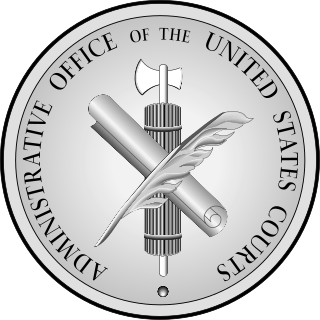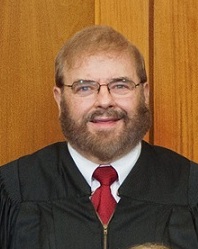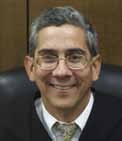In most common law jurisdictions, the attorney general or attorney-general is the main legal advisor to the government. In some jurisdictions, attorneys general also have executive responsibility for law enforcement, prosecutions or even responsibility for legal affairs generally. In practice, the extent to which the attorney general personally provides legal advice to the government varies between jurisdictions, and even between individual office-holders within the same jurisdiction, often depending on the level and nature of the office-holder's prior legal experience.

The United States Marshals Service (USMS) is a federal law enforcement agency in the United States. The Marshals Service serves as the enforcement and security arm of the U.S. federal judiciary, although it is an agency of the U.S. Department of Justice and operates under the direction of the U.S. Attorney General. It is the oldest U.S. federal law enforcement agency, created by the Judiciary Act of 1789 during the presidency of George Washington as the "Office of the United States Marshal". The USMS as it stands today was established in 1969 to provide guidance and assistance to U.S. Marshals throughout the federal judicial districts.
A solicitor general or solicitor-general, in common law countries, is usually a legal officer who is the chief representative of a regional or national government in courtroom proceedings. In systems that have an attorney-general, the solicitor general is often the second-ranked law officer of the state and a deputy of the attorney-general. The extent to which a solicitor general actually provides legal advice to or represents the government in court varies from jurisdiction to jurisdiction, and sometimes between individual office holders in the same jurisdiction.
The Director of Public Prosecutions (DPP) is the office or official charged with the prosecution of criminal offences in several criminal jurisdictions around the world. The title is used mainly in jurisdictions that are or have been members of the Commonwealth of Nations.

In the United States, a district attorney (DA), county attorney, county prosecutor, state's attorney, prosecuting attorney, commonwealth's attorney, state attorney or solicitor is the chief prosecutor or chief law enforcement officer representing a U.S. state in a local government area, typically a county or a group of counties. The exact and scope of the office varies by state. Generally, the prosecutor represents the people of the jurisdiction. With the exception of three states, district attorneys are elected, unlike similar roles in other common law jurisdictions.
The Law Officers are the senior legal advisors to His Majesty's Government of the United Kingdom and devolved governments of Northern Ireland, Scotland and Wales. They are variously referred to as the Attorney General, Solicitor General, Lord Advocate, or Advocate General depending on seniority and geography - though other terms are also in use, such as the Counsel General for Wales. Law Officers in these roles are distinguished by being political appointees, while also being bound by the duties of independence, justice and confidentiality among the other typical professional commitments of lawyers. These roles do not have any direct oversight of prosecutions nor do they directly lead or influence criminal investigations. This is a distinguishing factor between Law Officers and the State Attorneys General of the United States or US Attorney General.

The Supreme Court (Filipino: Kataas-taasang Hukuman; colloquially referred to as the Korte Suprema, is the highest court in the Philippines. The Supreme Court was established by the Second Philippine Commission on June 11, 1901 through the enactment of its Act No. 136, an Act which abolished the Real Audiencia de Manila, the predecessor of the Supreme Court.

The Philippine Coast Guard (PCG) is recognized as the third armed uniformed service of the country attached to the Philippines' Department of Transportation, tasked primarily with enforcing laws within Philippine waters, conducting maritime security operations, safeguarding life and property at sea, and protecting marine environment and resources; similar to coast guard units around the world. In case of a declaration of war, the Coast Guard shall also serve as an attached service of the Department of National Defense.

The government of the Philippines has three interdependent branches: the legislative, executive, and judicial branches. The Philippines is governed as a unitary state under a presidential representative and democratic constitutional republic in which the president functions as both the head of state and the head of government of the country within a pluriform multi-party system.

The Administrative Office of the United States Courts, or the Administrative Office (AO) for short, is the administrative agency of the United States federal court system, established in 1939. The central support entity for the federal judicial branch, the AO provides a wide range of legislative, administrative, legal, financial, management, program, and information technology support services to the federal courts.

The Department of Justice is under the executive department of the Philippine government responsible for upholding the rule of law in the Philippines. It is the government's principal law agency, serving as its legal counsel and prosecution arm. It has its headquarters at the DOJ Building in Padre Faura Street, Ermita, Manila.

Reynato Puno y Serrano, KGCR is a Filipino jurist. He served as the 22nd chief justice of the Supreme Court of the Philippines from December 8, 2007, by President Gloria Macapagal Arroyo until his mandatory retirement on May 17, 2010. Puno had initially been appointed to the Supreme Court as an associate justice on June 28, 1993.

The Sandiganbayan is a special appellate collegial court in the Philippines that has jurisdiction over criminal and civil cases involving graft and corrupt practices and other offenses committed by public officers and employees, including those in government-owned and controlled corporations. The special court was established by Presidential Decree No. 1486. It was subsequently modified by Presidential Decree No. 1606 and by Republic Acts 7975, 8249 and 10660. It is equal in rank to the Court of Appeals, and consists of fourteen Associate Justices and one Presiding Justice. The Office of the Ombudsman owns exclusive authority to bring cases to the Sandiganbayan.

Loren A. Smith is a senior judge of the United States Court of Federal Claims. He served as the court's Chief Judge from 1986 to 2000.

The Executive Office for Immigration Review (EOIR) is a sub-agency of the United States Department of Justice whose chief function is to conduct removal proceedings in immigration courts and adjudicate appeals arising from the proceedings. These administrative proceedings determine the removability and admissibility of individuals in the United States. As of January 19, 2023, there were sixty-eight immigration courts and three adjudication centers throughout the United States.

Agnes Vicenta Salayo Torres-Devanadera, also known as Agnes VST Devanadera, is a Filipina lawyer and politician who is currently the president and CEO of Clark Development Corporation since her appointment by Bongbong Marcos in 2022. She previously served as the chairperson of the Energy Regulatory Commission (ERC) from 2017 to 2022 during the Duterte administration. During the Arroyo administration, she served as the Solicitor General of the Philippines, the first woman to hold the post. She was also the acting Secretary of Justice on two short stints.

The District of Columbia has a mayor–council government that operates under Article One of the United States Constitution and the District of Columbia Home Rule Act. The Home Rule Act devolves certain powers of the United States Congress to the local government, which consists of a mayor and a 13-member council. However, Congress retains the right to review and overturn laws created by the council and intervene in local affairs.

Marco Antonio Hernandez is a United States district judge of the United States District Court for the District of Oregon.

The Judicial Service Commission (JSC) of Kenya is an independent Commission established under Article 171 of the Constitution of Kenya. Its mandate as stipulated in Article 172 of the Constitution is to promote and facilitate the independence and accountability of the Judiciary and the efficient, effective and transparent administration of justice. The commission has 11 members with the initial team appointed in December 2010.

Persida V. Rueda-Acosta is a Filipina lawyer who currently serves as the chief of the Public Attorney's Office (PAO) since 2001.
















